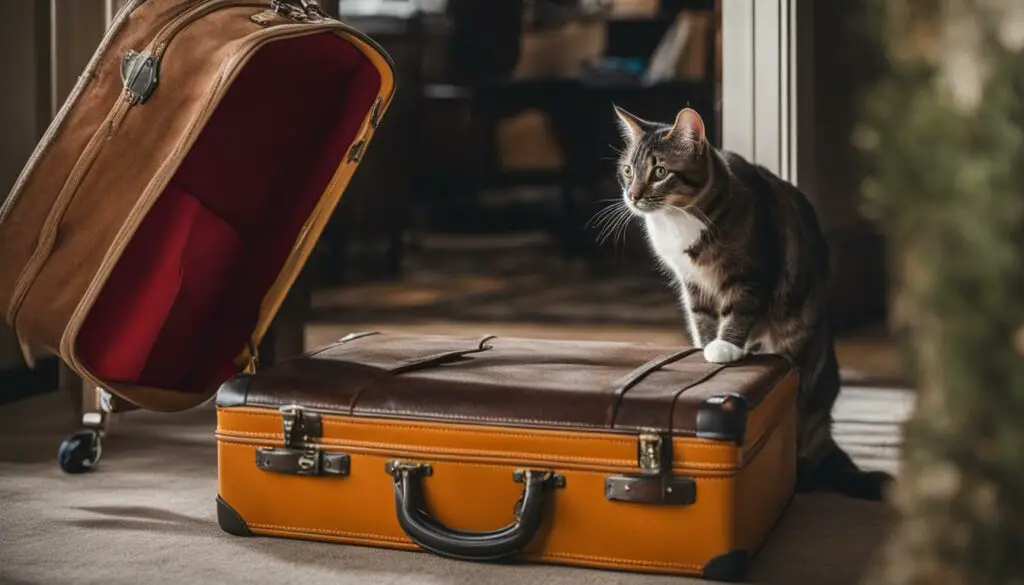Going on vacation can be a stressful time for both cat owners and their feline companions. Cats are creatures of habit and thrive on routine, so any disruption to their daily lives can often result in behavioral changes and stress. In this article, I will explore the various aspects of cat behavior after returning home from vacation, including their reactions, adjustments, and tips to help them readjust to their normal routine.
After a vacation, it’s important to understand your cat’s behavior and provide the necessary support to help them transition smoothly. By implementing the right strategies and giving them time to readjust, you can ensure their well-being and strengthen your bond with them.
Key Takeaways:
- Returning home from vacation can cause behavioral changes and stress in cats.
- Cats thrive on routine, so maintaining a consistent schedule is crucial.
- Preparing your cat before vacation and providing comfort during your absence can help reduce anxiety.
- Creating a calm environment and engaging in playtime can aid in their adjustment after returning home.
- Monitoring your cat’s behavior and meeting their emotional needs is essential for their well-being.
The Impact of Change on Cats
Cats are highly sensitive creatures, and any change in their environment can have a significant impact on their behavior. This includes going on vacation and returning home. When cats experience a disruption in their routine, such as being away from their owners, they can exhibit various behavioral changes. These changes are often the result of anxiety, stress, and confusion.
After being away on vacation, cats may show signs of increased hiding, aggression, or excessive vocalization. They may also become more clingy or exhibit changes in their eating or litter box habits. These behaviors are their way of expressing their emotions and trying to adjust to the new situation. It’s important for cat owners to understand these changes and provide the necessary support and reassurance to help their furry friends readjust.
“When their owners are away, cats may experience a range of emotions, including anxiety, stress, and even confusion.”
To assist cats in adapting to their normal routine after vacation, it’s crucial to establish a calm and familiar environment. This can be achieved by maintaining a consistent feeding schedule, providing comforting scents like their favorite blanket, and engaging them in interactive play sessions. Additionally, creating a peaceful atmosphere through the use of calming techniques, such as playing soft music or providing visual stimulation, can help alleviate their stress and anxiety.
| Common Behavioral Changes in Cats After Vacation | How to Provide Support and Reassurance |
|---|---|
| Increased hiding | Ensure quiet and safe spaces for your cat to retreat to. |
| Aggression | Give your cat space and avoid confrontations. Redirect their attention to toys or engage in calming play. |
| Excessive vocalization | Talk to your cat in a soothing voice and provide calming techniques like music or pheromone diffusers. |
| Changes in eating or litter box habits | Maintain a consistent feeding schedule and ensure a clean litter box. Monitor for any signs of distress or health issues. |
By understanding the impact of change on cats and implementing strategies to support their emotional well-being, cat owners can help their furry companions navigate the transition after returning home from vacation.
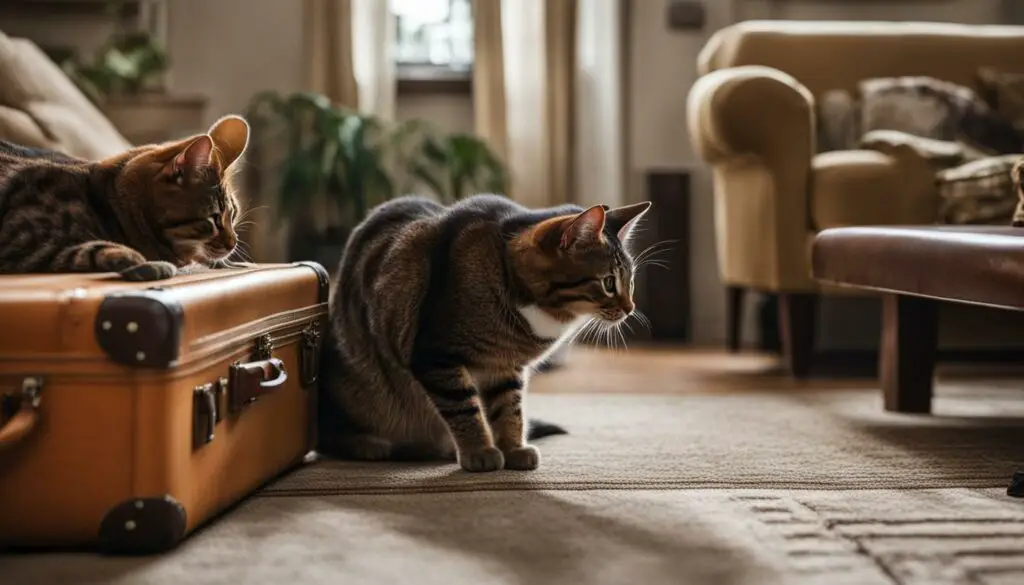
Preparing Your Cat Before Vacation
Before going on vacation, it is crucial to take steps to prepare your cat for your absence. Cats can experience anxiety and stress when their routine is disrupted, so maintaining a consistent schedule leading up to your departure can help minimize their anxiety. Stick to regular feeding times, playtime, and provide opportunities for exploration, such as letting them investigate your suitcases. By doing so, you are helping your cat feel more secure and reducing separation anxiety.
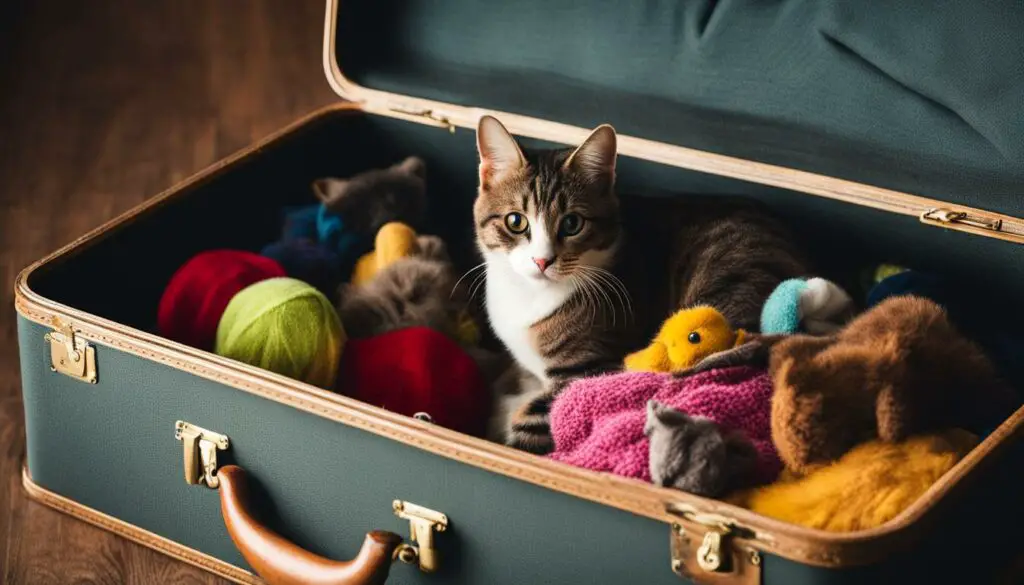
Another helpful way to ease your cat’s anxiety before vacation is to leave a familiar scent behind. Consider leaving a piece of clothing or bedding that carries your scent. This can provide comfort and reassurance to your cat in your absence. Your scent acts as a reminder of your presence and can help reduce their stress levels. Additionally, consider using pheromone sprays or diffusers, which release calming scents that can help create a soothing environment for your cat.
Lastly, if your cat is particularly prone to anxiety or stress, you may want to consult with your veterinarian before your trip. They can provide guidance on additional measures to help alleviate your cat’s anxiety, such as medications or natural remedies. Taking proactive steps to prepare your cat before vacation will go a long way in ensuring their well-being and peace of mind while you are away.
During Your Vacation
While you are away on vacation, it’s important to stay connected with your cat and provide them with comfort and reassurance. Maintaining a bond and sense of security can help minimize stress and anxiety in your feline friend. Here are some tips to help calm your cat while you’re enjoying your time away:
- Utilize video chats: Set up video calls with your cat so you can see and talk to them. This can provide a sense of familiarity and help them feel connected to you.
- Leave a comforting scent: Leave a worn T-shirt or blanket with your scent on it. The familiar smell will offer comfort and reassurance to your cat in your absence.
- Use calming drops: Consider using calming drops specially formulated for cats. These drops can help alleviate anxiety and promote a sense of calmness while you’re away.
- Maintain a consistent routine: Ensure that the caretaker for your cat sticks to their regular routine, including feeding times, playtime, and providing affection. Consistency can provide a sense of stability and reduce stress for your cat.
- Provide familiar toys and treats: Leave your cat with their favorite toys and treats to keep them entertained and engaged. Familiar items can help them feel more at ease during your absence.
By implementing these strategies, you can help minimize your cat’s stress and ensure they feel secure while you’re away. Remember that every cat is unique, so it’s essential to observe their reactions and adjust accordingly to provide the best care for your furry friend.
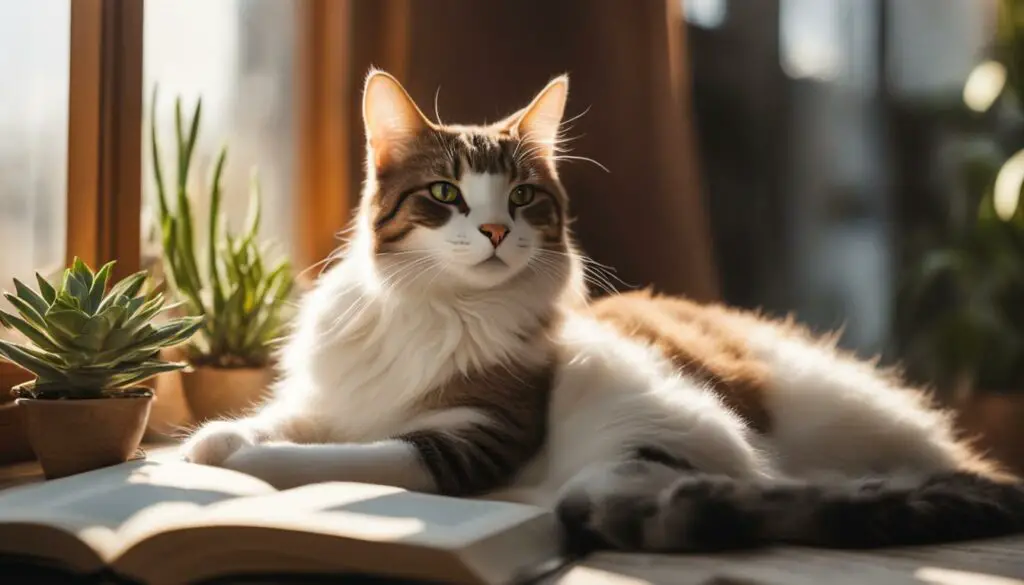
Owner’s Story: Staying Connected
“When I went on vacation last summer, I was worried about how my cat, Whiskers, would handle my absence. To stay connected, I set up video calls every day. Seeing Whiskers’ face and hearing her purr brought me so much joy, and I could tell she recognized my voice. I also left one of my sweaters with her, and she snuggled up to it every night. It was comforting to know that even though I couldn’t be there physically, I was still able to provide her with love and reassurance from afar.”
Staying connected with your cat while on vacation not only benefits them but also helps you feel more at ease knowing they are well taken care of and comforted. By utilizing technology, leaving familiar scents, and maintaining their routine, you can help ensure a smooth and stress-free experience for both you and your feline companion.
| Key Tips for Calming Your Cat While on Vacation | Benefits |
|---|---|
| Video chats | Creates a sense of familiarity and connection |
| Comforting scent | Provides reassurance and comfort |
| Calming drops | Alleviates anxiety and promotes calmness |
| Consistent routine | Offers stability and reduces stress |
| Familiar toys and treats | Keeps the cat entertained and engaged |
Returning Home to Your Cat
After a relaxing vacation, it’s time to return home to your beloved feline friend. However, it’s important to understand that your cat may need some time to readjust to the “new” situation, even though it is just a return to their normal routine. Cats are creatures of habit, and any disruption can cause stress and behavioral changes. So, how can you help your cat settle back in?
First and foremost, be patient. Give your cat the space to explore, sniff, and process the changes in their environment. Avoid overwhelming them with too much attention or physical contact right away. Allow them to come to you when they feel comfortable. By giving them this freedom, you are showing them that you respect their boundaries and allowing them to regain a sense of control.
A key factor in helping your cat readjust is re-establishing a consistent routine. Cats thrive on routine and familiarity, so try to stick to their regular feeding times, playtime, and any other activities that they are used to. This will help reassure them and make them feel more secure in their environment.
| Tip | Description |
|---|---|
| 1 | Set up a cozy and safe space for your cat |
| 2 | Keep their litter box clean and easily accessible |
| 3 | Provide plenty of fresh water and nutritious food |
| 4 | Engage in interactive play sessions to bond with your cat |
Additionally, make sure to give your cat plenty of love and attention. Spend quality time with them, engaging in their favorite activities and providing affectionate gestures. This will help strengthen your bond and reassure them that you are back and fully present in their life.
Remember, every cat is unique and may require different amounts of time to readjust. Some cats may settle back in quickly, while others may take a few days or even weeks. The most important thing is to be patient, understanding, and supportive during this transition period. By creating a calm and nurturing environment and being consistent in your interactions, you can help your cat feel secure and ease their adjustment after returning home from vacation.
Monitoring Your Cat’s Behavior
After returning home from vacation, it’s important to closely monitor your cat’s behavior for any signs of stress or unusual behavior. Cats can experience a range of emotions and may exhibit changes in their behavior as they readjust to their normal routine. By paying attention to their actions and reactions, you can ensure that they are transitioning smoothly and address any issues that may arise.
Here are some key signs to look out for when monitoring your cat’s behavior:
- Changes in eating or drinking habits: A sudden decrease or increase in appetite can indicate stress or an underlying health issue.
- Litter box issues: If your cat starts eliminating outside of their litter box, it may be a sign of stress or discomfort.
- Excessive hiding: Cats may retreat to secluded spots if they feel overwhelmed or anxious.
- Aggression or unusual vocalization: Increased aggression towards people or other pets, as well as excessive meowing or yowling, can be signs of stress.
- Changes in sleep patterns: Cats may sleep more or less than usual when adjusting to a new routine.
If you notice any of these behavioral changes, it’s essential to provide your cat with a calm and supportive environment. Create a quiet space where they can retreat to if they feel overwhelmed and ensure they have access to their favorite hiding spots. It’s also a good idea to consult with a veterinarian, who can rule out any underlying medical conditions and provide guidance on reducing stress.
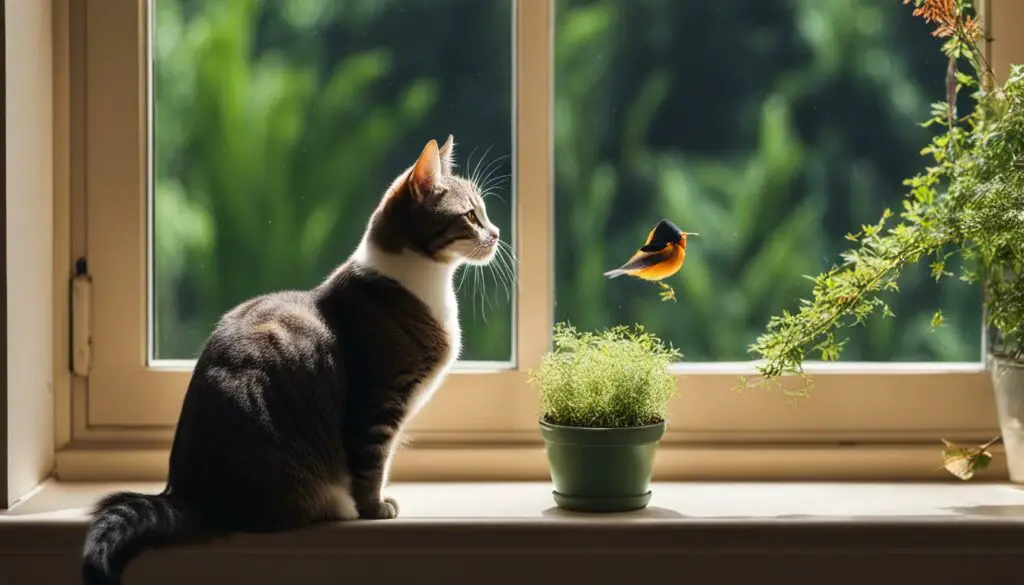
Quote:
“Monitoring your cat’s behavior after vacation is crucial to ensure their well-being and help them readjust to their normal routine. Look for signs of stress, such as changes in eating habits or excessive hiding, and provide a calm and supportive environment.”
Table: Signs of Stress in Cats
| Signs of Stress | Description |
|---|---|
| Decreased appetite | Cats may eat less or refuse to eat altogether when stressed. |
| Increased aggression | Stress can trigger aggressive behavior towards humans or other animals. |
| Excessive hiding | Cats may seek out secluded spots to escape from stressful situations. |
| Changes in litter box habits | Stress can cause cats to eliminate outside of their litter box. |
| Excessive vocalization | Cats may meow or yowl excessively when stressed or anxious. |
| Changes in sleep patterns | Stressed cats may sleep more or less than usual. |
By closely monitoring your cat’s behavior and taking appropriate measures to reduce stress, you can ensure a smooth transition after returning home from vacation. Remember to be patient and provide your cat with the support and care they need during this time of adjustment.
Managing Food and Diet
After returning from vacation, it’s common for cat owners to have concerns about their cat’s appetite and weight. It’s natural to worry, but it’s important not to overfeed your cat in an attempt to make up for missed meals. Instead, stick to their regular feeding schedule and provide them with their usual portion sizes. Cats are creatures of habit, and maintaining a consistent diet will help them readjust to their normal eating habits.
Gradually, your cat will adjust and return to their usual appetite. It’s important to remember that a few extra treats to make them feel special are fine, but avoiding overfeeding is crucial for their overall health. Keeping their diet consistent and balanced will ensure that they maintain a healthy weight and receive the nutrients they need.
It’s also worth noting that some cats may experience a decrease in appetite after returning from vacation. This could be due to stress or anxiety caused by the change in their environment. If your cat is not eating or showing signs of prolonged disinterest in food, it’s essential to monitor their behavior and seek veterinary advice if necessary. A sudden and drastic change in appetite could be a sign of an underlying health issue that needs to be addressed.
Feeding Tips for Cats After Vacation:
- Stick to your cat’s regular feeding schedule
- Provide them with their usual portion sizes
- Avoid overfeeding, even if you’re worried about missed meals
- Gradually reintroduce treats, but be mindful of portion sizes
- Monitor your cat’s appetite and seek veterinary advice if necessary
| Signs of Overfeeding: | Signs of Underfeeding: |
|---|---|
|
|
Remember, maintaining a healthy diet is essential for your cat’s overall well-being. By following these feeding tips and monitoring your cat’s appetite, you can ensure they readjust to their normal eating routine after returning from vacation.

Reconnect Through Play
After being away on vacation, spending quality playtime with your cat is an excellent way to reconnect and ease their stress. Engaging in interactive play sessions using their favorite toys not only helps them release pent-up energy but also strengthens the bond between you and your cat.
Playing with your cat after a vacation serves as a means of reassurance, allowing them to feel secure in your presence and reducing any lingering separation anxiety. Through play, cats also experience mental stimulation, which can help alleviate stress and keep them physically fit.
Whether it’s a game of chase, pouncing on a toy, or batting at a feather wand, playtime offers an opportunity for you to actively engage with your cat. It provides a platform for communication and understanding, as you observe their body language and respond to their cues. By dedicating time to play with your cat, you are not only providing them with physical and mental stimulation but also nurturing the bond that you share.
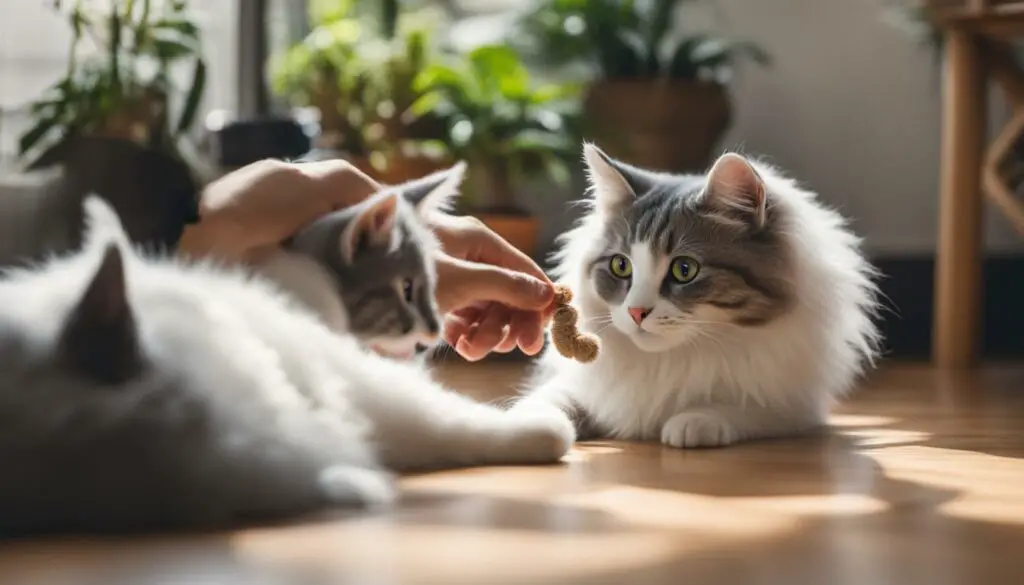
As a cat owner, it’s important to recognize the importance of play for cats. Not only does it keep them entertained and mentally stimulated, but it also promotes a sense of well-being and reduces behavioral issues. Regular play sessions can help prevent boredom, loneliness, and destructive behavior.
Incorporating play into your cat’s daily routine is essential, as it allows them to express their natural instincts and behaviors. Interactive toys, such as catnip-filled mice or puzzle feeders, can provide mental stimulation and keep them engaged for longer periods of time.
Remember to choose toys that are safe and suitable for your cat’s preferences and age. Rotating toys regularly can help maintain their interest and curiosity. Additionally, varying the types of play, such as engaging in both active and passive play, can provide a well-rounded experience for your cat.
Using Calming Techniques
After returning home from a vacation, it’s not uncommon for cats to experience anxiety and stress. To help your feline friend relax and readjust, there are various calming techniques you can try.
Create a Calm Environment
Creating a calm environment is essential in helping your cat feel safe and secure after a vacation. Ensure they have a quiet space where they can retreat to if they feel overwhelmed. This can be a cozy corner with their bed, blankets, and toys. Consider using pheromone diffusers or sprays, specifically designed for cats, to create a soothing atmosphere.
Use Calming Drops for Cats
Calming drops can be an effective way to reduce anxiety and promote relaxation in cats. These drops typically contain natural flower extracts, such as lavender, known for their calming properties. Follow the instructions on the product and administer the drops as directed. Be sure to consult your veterinarian before using any calming products to ensure they are safe for your cat.
Encourage Relaxation through Gentle Stimulation
Gentle stimulation, such as soft strokes and gentle petting, can help your cat relax and feel more at ease. Pay attention to their body language and only provide affection if they welcome it. You can also try using a soft brush or gently massaging their ears to promote relaxation. Remember, each cat is unique, so observe their preferences and adapt your approach accordingly.
| Calming Techniques for Cats | Benefits |
|---|---|
| Create a calm environment | Reduces stress and anxiety |
| Use calming drops for cats | Promotes relaxation and calmness |
| Encourage gentle stimulation | Helps cats relax and feel more at ease |
By implementing these calming techniques and creating a peaceful environment, you can support your cat’s emotional well-being and help them adjust after returning home from a vacation. Remember to be patient and understanding, as it may take some time for your cat to fully readjust to their familiar surroundings.
Supporting Your Cat’s Emotional Needs
After returning from vacation, your cat may require some extra comfort and emotional support to help them readjust. Just like humans, cats can experience separation anxiety and stress when their routine is disrupted. Here are some ways you can provide the emotional support your cat needs:
- Spending quality time with your cat: Dedicate time each day to sit and interact with your cat, offering them affection and reassurance. This can help strengthen the bond between you and provide a sense of security for your cat.
- Creating a calm environment: Provide a quiet and peaceful space for your cat to retreat to when they need some alone time. This can be a cozy corner with their bed or a quiet room where they can relax without disturbance.
- Offering physical comfort: Brushing your cat’s fur, providing gentle ear rubs, or giving them a calming massage can help reduce stress and promote relaxation. These physical gestures can also serve as a form of bonding between you and your cat.
By focusing on your cat’s emotional needs and providing them with the comfort and reassurance they seek, you can help reduce their separation anxiety and make their transition back to normalcy smoother.
Remember, each cat is unique, and their emotional needs may vary. Pay attention to their behavior and body language to better understand what makes them feel secure and loved.
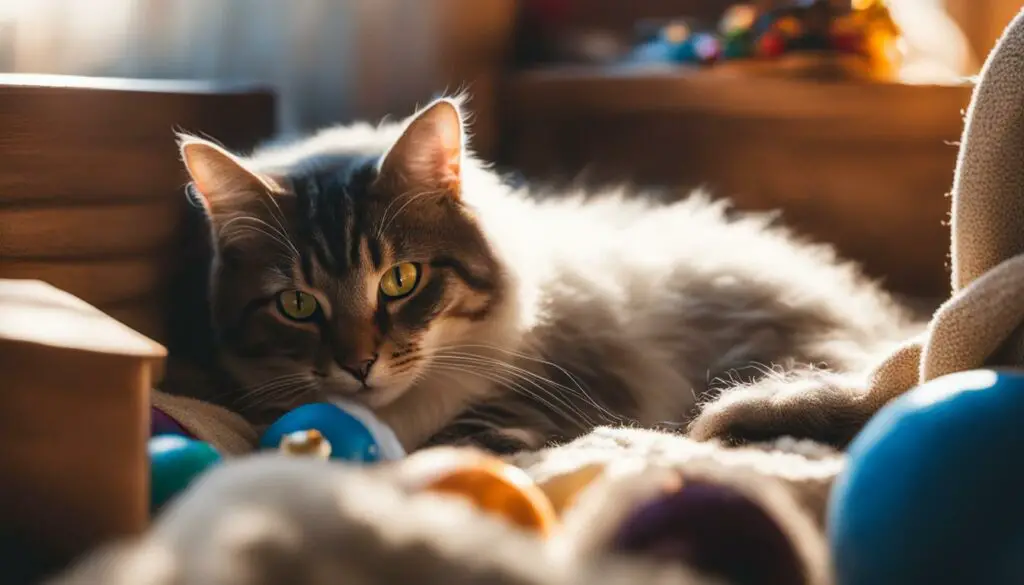
What the Experts Say
“Cats rely on their owners for emotional support, especially after a period of absence. Taking the time to connect with your cat and meet their emotional needs is essential in reducing their stress and anxiety.” – Dr. Emily Johnson, Feline Behavior Specialist
Communication and Reassurance
When it comes to helping your cat readjust after returning home from vacation, communication and reassurance play a vital role. By using your voice to calm your cat, you can provide comfort and a sense of security. Talking to your cat in a soft, soothing tone lets them know that you are present and can help alleviate any anxiety or stress they may be feeling.
Maintaining a strong bond with your cat is essential during this time. Spend dedicated time with them, offering affection and reassurance. Brushing their fur, giving gentle ear rubs, and engaging in slow blinks are all ways to provide comfort and signal to your cat that your connection is still strong. These gestures can help reduce stress and reinforce the bond between you and your furry friend.
Remember, cats are highly perceptive and can pick up on subtle cues, so it’s important to create a calm and soothing environment. Avoid loud noises or sudden movements that may startle your cat. Instead, provide a peaceful atmosphere by playing soft music or nature sounds. This can help further promote relaxation and aid in their adjustment process.
The Power of Communication
Communicating with your cat after returning from vacation is not only about using your voice but also about observing their body language. Pay attention to their signals and responses, as this can provide valuable insight into their emotional state. If your cat shows signs of discomfort or stress, it’s important to approach them with patience and understanding.
In addition to verbal communication, physical contact can also be reassuring for your cat. Gentle strokes or cuddles can help them feel secure and loved. However, always respect your cat’s boundaries and be mindful of their individual preferences. Some cats may prefer to have their own space, especially after a period of change or stress.
“Communication and reassurance are key to helping your cat adapt and thrive after returning home from vacation.”
Remember, every cat is unique, and their response to returning home from vacation may vary. Some cats may adjust quickly, while others may take more time. Be patient, understanding, and consistent in your interactions with them. With proper communication and reassurance, you can support your cat’s emotional well-being and help them feel safe and nurtured.
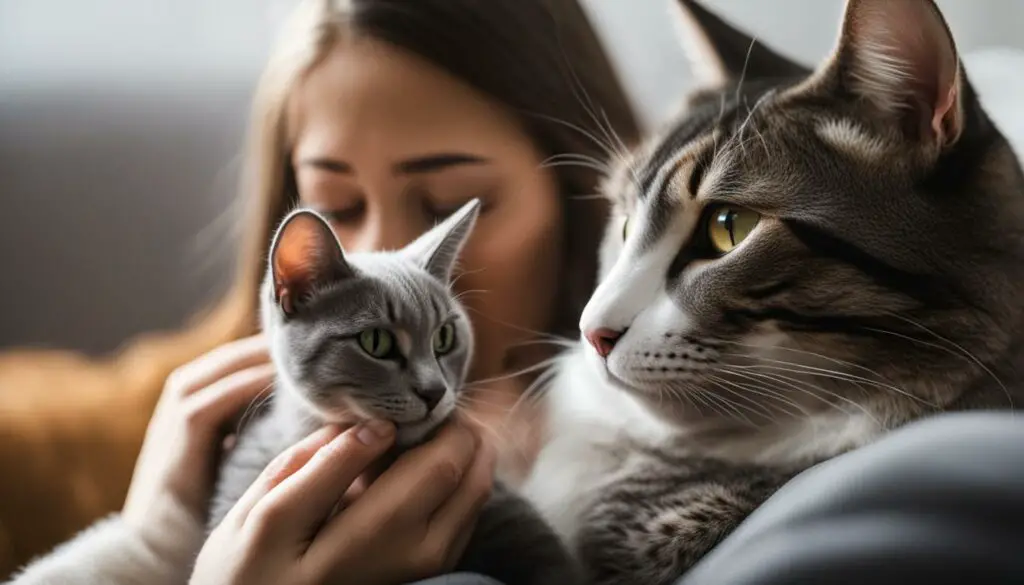
| Ways to Communicate with Your Cat | Benefits |
|---|---|
| Talking in a soft, soothing tone | Provides comfort and security |
| Engaging in slow blinks | Reinforces the bond between you and your cat |
| Gentle stroking and cuddling | Offers reassurance and physical contact |
| Observing body language | Provides insights into your cat’s emotional state |
Music and Visual Stimulation for Cats
Music and visual stimulation can be effective tools in calming and entertaining cats, especially after they return home from vacation. Just like humans, cats can find comfort and relaxation in soothing tunes. Playing soft, calming music can create a peaceful atmosphere and help reduce stress in cats. Cats and music have long been studied, and research has shown that certain types of music, such as classical or ambient sounds, can have a positive impact on their well-being. Soothing melodies can help cats unwind and feel more at ease in their environment.
Additionally, visual stimulation can help keep cats relaxed and entertained. Providing them with engaging content, such as videos of birds or fish, can captivate their attention and stimulate their natural instincts. Cats are visual creatures, and watching moving objects can be a source of entertainment for them. Consider playing videos specifically designed for cats or even leaving a window with a nice view open for them to gaze outside. This can help prevent boredom and provide mental stimulation, which is essential for a cat’s overall well-being.
Using music and visual stimulation in combination can be a powerful way to create a calming and engaging environment for your cat. Consider playing soft music in the background while providing them with visual content to watch. This multi-sensory approach can help create a serene space where your cat feels safe and content. Experiment with different music genres and visual stimuli to see what resonates best with your cat’s preferences. Remember that each cat is unique, so it may take some trial and error to find the perfect combination that helps your furry friend relax and enjoy their surroundings.
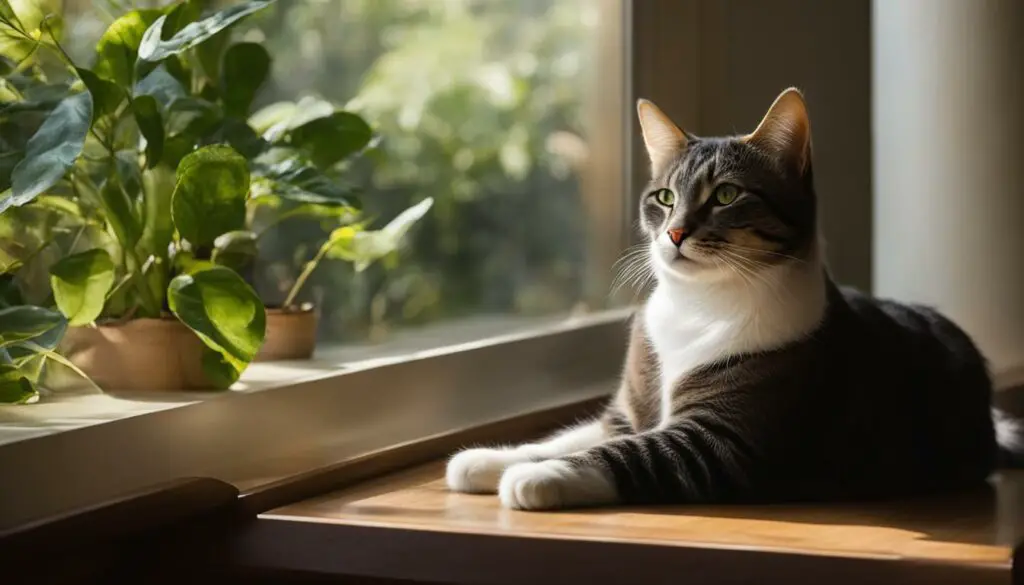
Benefits of Music and Visual Stimulation for Cats:
- Reduces stress and anxiety
- Provides mental stimulation and prevents boredom
- Creates a calming environment for relaxation
- Enhances the bond between you and your cat
- Helps your cat adjust after returning home from vacation
By incorporating music and visual stimulation into your cat’s daily routine, you can help them feel more at ease and prevent behavioral issues that can arise from stress or boredom. Remember to choose music and visual content that is appropriate and soothing for your cat, avoiding any loud or jarring sounds. With these simple yet effective techniques, you can create a peaceful and engaging environment that supports your cat’s well-being.
Conclusion
Returning home from vacation can be a challenging time for both cat owners and their feline companions. After being away, cats may experience behavioral changes and signs of stress as they readjust to their normal routine. Understanding their needs and providing a supportive environment is crucial to help ease their transition and ensure their well-being.
Patience is key during this period. Cats may need some time to process the changes and get used to the “new” situation, even if it’s just a return to their regular routine. Give them space to explore, sniff, and adjust at their own pace.
Consistency is also important. Re-establish a familiar routine with feeding times, playtime, and affection to reassure your cat and help them settle back in. Regular interaction, comfort, and open communication will strengthen your bond and provide emotional support to reduce any lingering separation anxiety.
Creating a calm and stimulating environment can also aid in their adjustment. Playing soft, soothing music, providing visual stimulation, and using calming techniques like natural flower extracts can all help promote relaxation and reduce stress in cats.
By taking these steps and adapting to your cat’s needs, you can help them adapt and thrive after returning home from vacation. Remember, understanding, patience, and consistent care are the keys to a happy and stress-free reunion with your beloved feline companion.
FAQ
How do cats react to returning home from vacation?
Cats may experience anxiety, stress, and confusion after returning home from vacation.
What are some behavioral changes cats may exhibit after vacation?
Cats may display increased hiding, aggression, or excessive vocalization as a result of the changes in their environment.
How can I prepare my cat before going on vacation?
Maintaining a consistent schedule, leaving a familiar scent, and providing opportunities for exploration can help reduce your cat’s anxiety and stress.
How can I stay connected with my cat while on vacation?
You can stay connected through video chats, leaving a worn T-shirt with your scent, or using calming drops to alleviate their anxiety. Keeping a consistent routine with their caretaker and providing familiar toys and treats can also help minimize stress.
How can I help my cat readjust after returning home from vacation?
Give your cat time and space to explore and re-establish a consistent routine with feeding times, playtime, and affection. This will help reassure your cat and ease their transition back to normalcy.
What should I look out for in my cat’s behavior after returning from vacation?
Pay attention to any unusual behavior such as aggression, excessive hiding, or changes in eating or litter box habits. These may be signs of stress or underlying health issues.
How should I manage my cat’s food and diet after returning from vacation?
Stick to their regular feeding schedule and portion sizes. Avoid overfeeding as it can impact their overall health. Gradually, they will adjust and return to their normal eating habits.
How can I reconnect with my cat after returning from vacation?
Engage in quality playtime using their favorite toys, encouraging them to chase, pounce, and release energy. Playtime helps reduce anxiety and strengthens the bond between you and your cat.
What calming techniques can I use for my cat after returning from vacation?
Calming drops, soft music or nature sounds, and providing a peaceful environment can help soothe your cat and aid in their relaxation and adjustment.
How can I support my cat’s emotional needs after returning from vacation?
Spend dedicated time with your cat, offering comfort, affection, and a calm environment. Brushing, ear rubs, and slow blinks can help alleviate stress and signal your bond is strong.
How can communication and reassurance help my cat after returning from vacation?
Talk to your cat in a soft, soothing voice, providing familiar verbal cues and reassurance. Your voice can help calm and comfort your cat, reminding them of your presence and providing security.
Can music and visual stimulation help calm cats after returning from vacation?
Yes, playing soft, soothing music or nature sounds and providing visual stimulation through the animal channel or nature documentaries can create a peaceful atmosphere and reduce stress in cats.
How can I ensure my cat’s well-being after returning from vacation?
By understanding their needs, providing a supportive environment, and offering comfort and reassurance, you can help ease your cat’s transition and ensure their well-being.
Source Links
- https://www.litter-robot.com/blog/how-to-get-back-to-normal-with-your-cat-after-vacation/
- https://catinaflat.com/blog/how-to-help-your-cat-adjust-when-youre-on-holiday
- https://www.thesprucepets.com/vacations-and-cat-behavior-problems-553930

